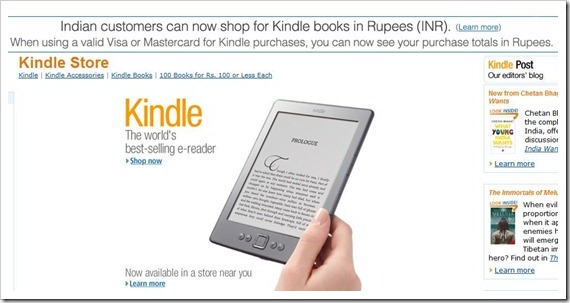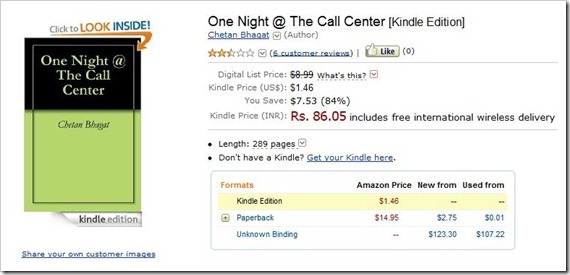Amazon has announced the launch of its India specific Kindle Store where e-books can be purchased in Indian Rupees. The online store has a comprehensive collection of titles ranging from Chetan Bhagat to some of Nielsen’s bestsellers.
Russ Grandinetti, VP Kindle Content, Amazon said "We are proud to launch this new Kindle store for Indian customers – offering Kindle book purchases in rupees and the ability to buy and read the work of many great Indian authors"

Purchases can be made by Visa or MasterCard and once downloaded, they can be read on e-readers. Coinciding with the launch of its India Kindle Store, Amazon has also launched the sale of its bestselling Kindle e-book reader in India. It is priced at Rs. 6,999 and is currently being sold exclusively from Tata’s Croma retail stores or from their website cromaretail.com.
Amazon also launched Kindle Direct Publishing for Indian authors, allowing independent writers to easily publish books on the Kindle platform.
Amazon Kindle is one of the world’s most popular e-book readers. It weighs 170 grams and has a 6 inch 600 x 800 high-res E Ink display which makes it possible for readers to read with ease even in bright sunlight. The device wirelessly downloads books in just about a minute and with a storage capacity of 2 GB, it can hold up to 1,400 books. Once fully charged, its battery will last for about one month.
Ajit Joshi, CEO and MD, Croma said "We are excited to be the first retailer in India to offer the latest generation Kindle to our customers. This product will launch exclusively in all Croma stores across India at an introductory price of 6,999 INR".
From pricing perspective though, you can get your hands on the latest-generation Kindle for less than Rs. 6000 on third party websites like eBay or Grabmore (who are selling it for Rs. 5886/-)
Will Indians bite the e-book bug?
We took a look at some of Chetan Bhagat’s bestsellers including One Night @ The Call Center and Five Point Someone at Amazon’s India Kindle Store. The e-books were priced at Rs. 91.35 each. In comparison, the same titles in were available for Rs. 98 in paperback and Rs. 295 in hardcover respectively on Flipkart.com. The cost of shipping is Rs. 30 if orders are less than Rs. 300.
If we were to compare One Night @ The Call Center in paperback from Flipkart.com to its e-book version from Amazon’s India Kindle Store, the difference would only be Rs. 6.65, in favour of the latter.

While customers may or may not bite from a price perspective, there are other advantages of buying e-books. Up to 1,400 titles can be carried in 170g Amazon Kindle which can fit in almost any backpack, if not a pocket. The e-reader is definitely a space saver.
Buyers will not have to worry about losing a book again because all purchases through the Kindle Store will automatically be backed up in a personal ‘Online Kindle Library’. They can be downloaded again anytime, anywhere for free. Additionally, downloaded e-books can also be backed up on compatible devices including a PC, iPad, iPod, iPhone and other android devices.
E-books are also portable and great for travellers. If you are planning to kick back on a sun chair on a beach in Goa while you catch up on your favourite titles, carrying an e-book reader is more convenient than carrying 5 hardcovers.
Readers also have the advantage of buying from virtually anywhere as long as they have access to Wi-Fi networks. You don’t necessarily need to be at the book store or wait for delivery of the hardcover you purchased online. E-books can be downloaded instantly.
From a book lover’s perspective, there are certain disadvantages of reading e-books. The real life feeling of holding a hardcover cannot be matched by an electronic device. Additionally, with e-books, there is nothing that readers can proudly display on their shelves at home.
Old school book lovers may argue that there is nothing that can beat the charm of picking up a hardcover, inhaling the typical scent of paper and reading through page after page. However that is what many commentators had to say when Amazon unveiled the first generation Kindle nearly half a decade back. In December last year, Bloomberg reported that customers were buying ‘well over’ 10 lakh Kindles every week. While a significant portion of this staggering figure can possibly attributed to Christmas sales, it is hard to ignore the product’s popularity.
